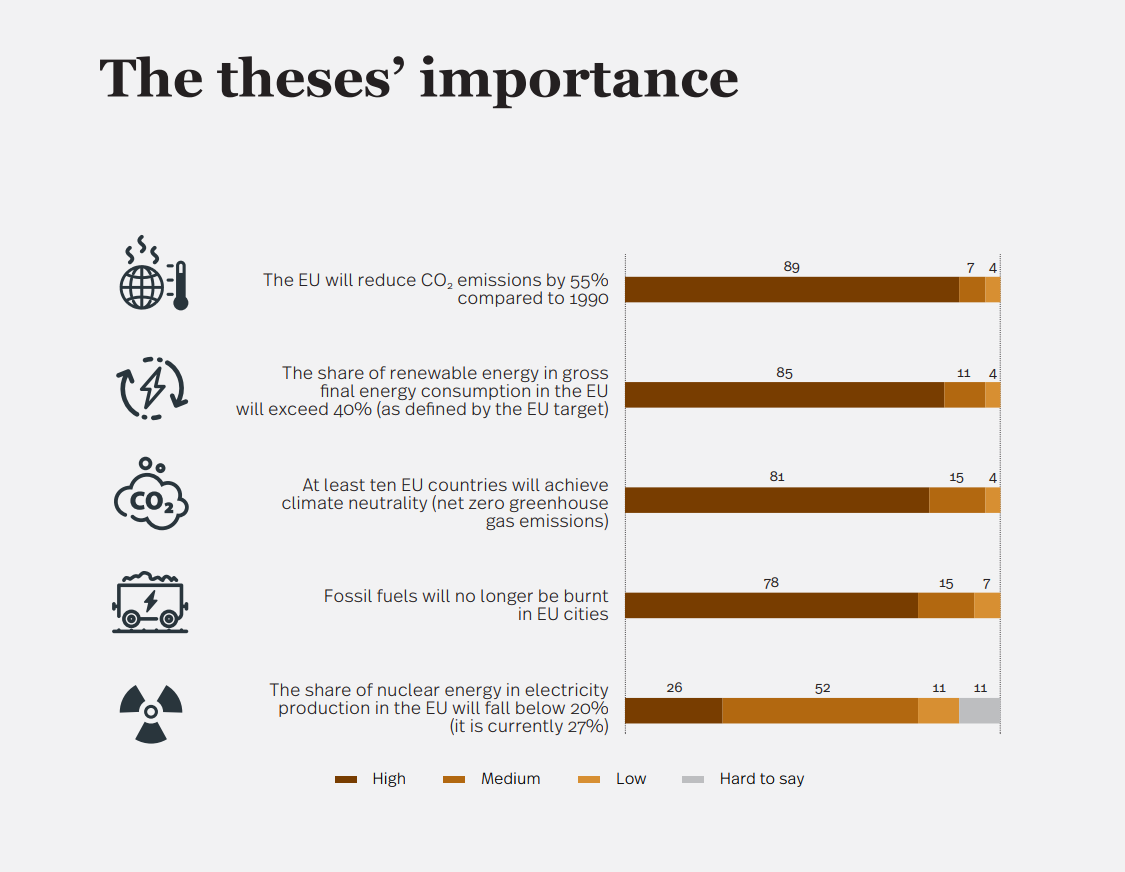At least 10 EU countries will be climate neutral by 2045

Published: 02/11/2021
The European Union will reduce CO2 emissions by 55 per cent compared to 1990, but no sooner than 2032. Due to accelerated decarbonisation, the first 10 countries will achieve climate neutrality by 2045.
The industry of key importance to the process will be nuclear energy, especially in the Member States previously relying on coal-fired power plants. At the same time, as many as 78 per cent of the experts surveyed by the Polish Economic Institute are of the opinion that a successful energy transition will largely depend on the elimination of fossil fuel combustion in EU cities – as follows from the PEI report entitled ‘European Union energy foresight’.
‘The implementation of the “Fit for 55” package, with the increased reduction target, poses the most important challenge to the European economy after the pandemic. Raising the target means that annual investment costs in the energy sector alone will be EUR 350 billion higher than in 2011–2020, a total of nearly EUR 5 trillion until 2030. According to the experts surveyed by the PEI, green transition will be primarily fostered by high expenditure – both EU and national spending. Simultaneously, funding issues and high costs of implementing innovative technology projects are indicated as the most significant barriers’, says Magdalena Maj, the head of the energy and climate team at the Polish Economic Institute.
Carbon dioxide emissions will be reduced by 55 per cent, but no sooner than 2032.
According to half of the experts, CO2 emissions will not be reduced by 55 per cent any sooner than 2032, two years after the date scheduled by the EU. Simultaneously, 2045 is indicated as the year of achieving climate neutrality by at least 10 EU Member States, whereas nearly every fifth expert (18 per cent) believes that climate neutrality will be reached by a minimum of 10 countries by 2040.
As regards the future of fossil fuels and further development of renewable energy sources, half of the respondents do not expect the elimination of fossil fuel combustion in EU cities to occur any sooner than 2041, but as many as 30 per cent of those surveyed consider the date to be 2030. According to the median of indications, the share of renewable energy in gross final energy consumption in the EU will exceed 40 per cent by 2035.
Nuclear power may effectively reduce emissions from the energy sector
In the opinion of the experts surveyed by the PEI, the most significant challenge to energy transition in the European Union is reducing CO2 emissions by 55 per cent by 2030 compared to 1990 (with the thesis importance indicator of 96 out of 100 points). Pushing the share of RES in gross final energy consumption above 40 per cent is considered to be almost equally important (91 points).
In contrast, the least significant problem related to energy transition appears to be a fall in the share of nuclear energy in electricity production below 20 per cent. It is worth emphasising that as many as one-third of the experts do not believe such an event to occur. In their opinion, wealthier EU Member States may replace some of their nuclear capacities with RES, but in the countries where a major role is still played by coal-fired power stations such facilities will be partly replaced with nuclear power plants.
The Polish Economic Institute is a public economic think-tank dating back to 1928. Its research spans foreign trade, macroeconomics, energy and the digital economy, with strategic analyses on key areas of social and public life in Poland. The Institute provides analysis and expertise for the implementation of the Strategy for Responsible Development and helps popularise Polish economic and social research in the country and abroad.
Media contact:
Ewa Balicka-Sawiak
Press Spokesperson
T: 48 727 427 918
Kategoria: Climate and Energy / Economic Foresight / Press releases / Report / Reports 2021






